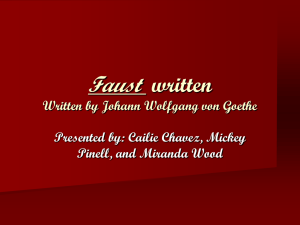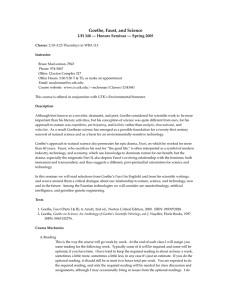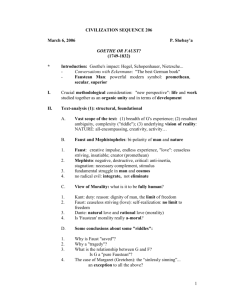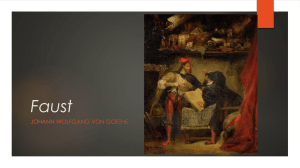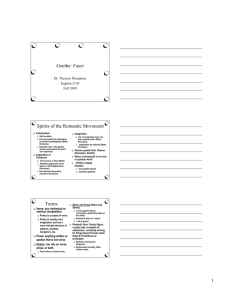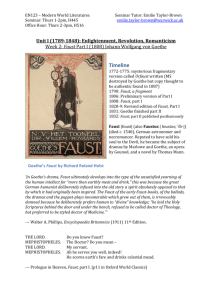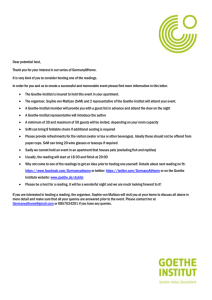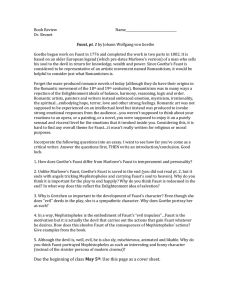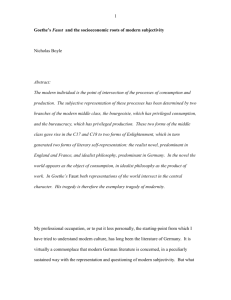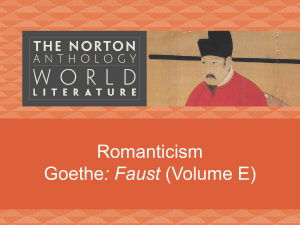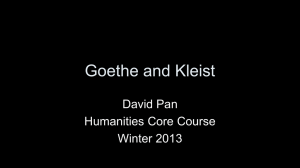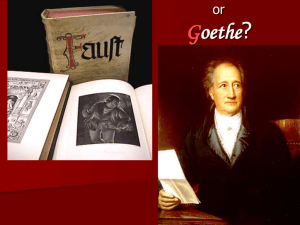Speech by Irena Veisaitė - Goethe
advertisement
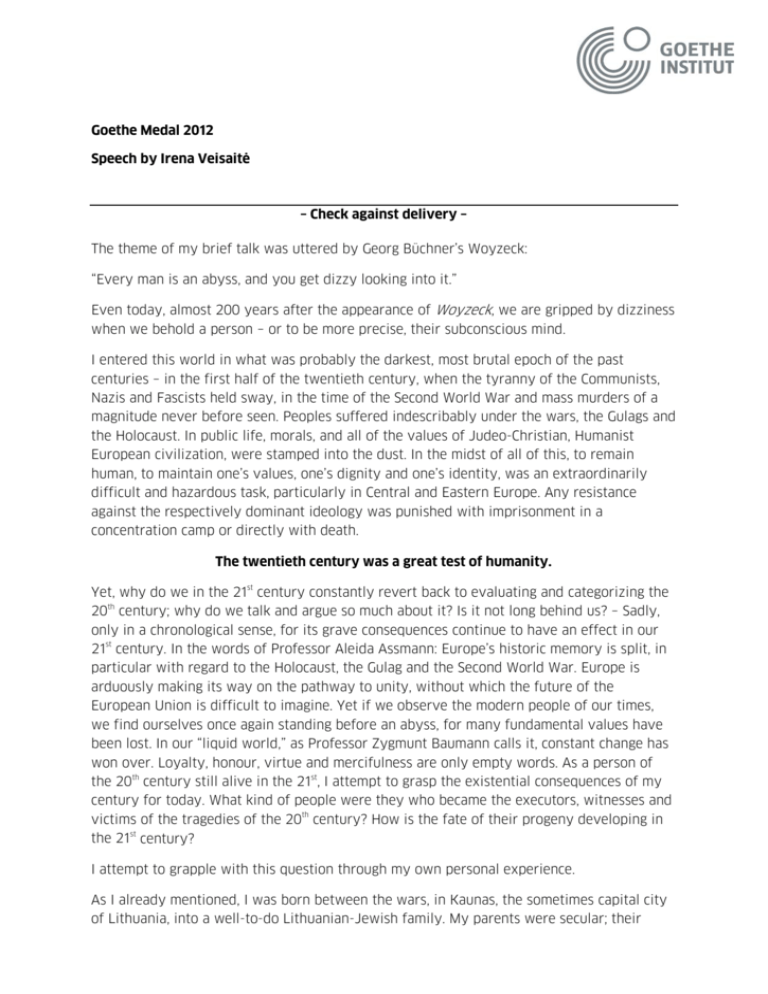
Goethe Medal 2012 Speech by Irena Veisaitė – Check against delivery – The theme of my brief talk was uttered by Georg Büchner’s Woyzeck: “Every man is an abyss, and you get dizzy looking into it.” Even today, almost 200 years after the appearance of Woyzeck, we are gripped by dizziness when we behold a person – or to be more precise, their subconscious mind. I entered this world in what was probably the darkest, most brutal epoch of the past centuries – in the first half of the twentieth century, when the tyranny of the Communists, Nazis and Fascists held sway, in the time of the Second World War and mass murders of a magnitude never before seen. Peoples suffered indescribably under the wars, the Gulags and the Holocaust. In public life, morals, and all of the values of Judeo-Christian, Humanist European civilization, were stamped into the dust. In the midst of all of this, to remain human, to maintain one’s values, one’s dignity and one’s identity, was an extraordinarily difficult and hazardous task, particularly in Central and Eastern Europe. Any resistance against the respectively dominant ideology was punished with imprisonment in a concentration camp or directly with death. The twentieth century was a great test of humanity. st Yet, why do we in the 21 century constantly revert back to evaluating and categorizing the th 20 century; why do we talk and argue so much about it? Is it not long behind us? – Sadly, only in a chronological sense, for its grave consequences continue to have an effect in our st 21 century. In the words of Professor Aleida Assmann: Europe’s historic memory is split, in particular with regard to the Holocaust, the Gulag and the Second World War. Europe is arduously making its way on the pathway to unity, without which the future of the European Union is difficult to imagine. Yet if we observe the modern people of our times, we find ourselves once again standing before an abyss, for many fundamental values have been lost. In our “liquid world,” as Professor Zygmunt Baumann calls it, constant change has won over. Loyalty, honour, virtue and mercifulness are only empty words. As a person of th st the 20 century still alive in the 21 , I attempt to grasp the existential consequences of my century for today. What kind of people were they who became the executors, witnesses and th victims of the tragedies of the 20 century? How is the fate of their progeny developing in the 21st century? I attempt to grapple with this question through my own personal experience. As I already mentioned, I was born between the wars, in Kaunas, the sometimes capital city of Lithuania, into a well-to-do Lithuanian-Jewish family. My parents were secular; their religion was humanism and tolerance. Both of them had studied in Germany. Representatives of various peoples met in our home. They spoke Lithuanian, Russian, German, French, Yiddish, and Polish. My childhood was happy and carefree. The collapse began with the Soviet occupation of Lithuania and reached its tragic pinnacle with the occupation of my country by Nazi Germany. My mother, my grandparents, my uncles and aunts did not survive the Holocaust. I myself looked into the eyes of death daily. Yet, as if by a miracle, but more precisely because I encountered good and selfless people, I remained alive. The humanistic European culture, also the German culture, which I inherited from my parents and teachers kept me from the danger of developing hatred and the desire for revenge even in the darkest times. To cite just one example, in the illegal underground school that I secretly attended in the ghetto of Kaunas, we learned Schiller’s ballads: “The Hostage,” “The Diver” and “The Glove,” among others. Surrounded by death and unimaginable atrocities, we heard the noble words of Schiller on friendship, loyalty and selfsacrifice. This contributed to us not losing hope that there were yet humaneness and compassion in the world. Another example: In November 1943, Lithuanian friends of my parents saved me from the Kauen ghetto; a little later I found a second mother in the Lithuanian woman Stefanija Ladigienė, who was a widow with six of her own children. Her husband, General Ladiga, was arrested by the Soviets in 1940 and shot in Russia in 1942. For my sake, Stefanija Ladigienė risked the lives of her entire family. I experienced genuine humaneness and charity. I did not realize until later what this meant for the development of my worldview. In time, it became clear to me that the love and sacrifice I experienced not only saved me physically, but also kept me alive spiritually. The Holocaust taught me to meet others with compassion and understanding and to never do to others what was done to me; the Holocaust made me grasp that in order to continue living, one must learn to love and to forgive. And now here I am in Weimar, the cradle of German Sturm und Drang and Weimar Classicism, of Enlightenment and Humanism. For the first time, I have come to the city of Goethe and Schiller, from whence the light, hope and faith in humanity emanated. And while st looking at the 21 century I ask myself what will gain the upper hand: individual and national egotism, greed for power and money, or the human conscience, human dignity and virtue? The questions asked by Goethe’s “Faust” have accompanied me all my life. Sadly, like Faust, I was unable to reach my goal. It seems as if Mephistopheles triumphed and that all of us, like Faust, are damned to the eternal agonies of this earthly hell, for none th of us has learned enough from the tragic experience of the horrible 20 century and therefore today we once again stand before an abyss. Even today, in many places of the world, hunger, war, genocide and hate dominate... I think so often of Schiller’s words from his “Song of the Bell”: “But of all horrors most atrocious / Is man at his own madness’ height.” Is there hope that humanity and world will become better and more just? I do not know. If we are to believe Goethe’s Faust, there is hope and, then again, there is not. There is no hope in that the lovely vision of the blind, dying Doctor Faustus that he “could ... but stand / With a free people, and upon free land,” was merely a product of his imagination. Yet, hope persists, for Faust is redeemed. The choir of angels sings, “Him, who, unwearied, still strives on / We have the power to free.” Perhaps it is merely my imagination, but I would like to st believe that 21 century humankind will withstand the nihilism of the postmodern world and return to the fundamental values of Lessing, Goethe and Schiller. Germany, too, with its Humanist heritage as a cornerstone, holds hope up high and serves as an example of how st th we in the 21 century should deal with and overcome the tragic legacy of the 20 century. I would like to believe that each of us, so like Faust in our tireless seeking for perfection, will not feel such great dizziness when we look into the abysses of our subconscious minds. “For this one only object do I live. / To the absorbing thought myself I give. / Freedom like Life — the last best truth we learn — / Man still must conquer, and in conquering earn” – with these words of Faust I close my speech. But, before I do, I would like to cordially thank the Goethe-Institut for this distinguished award, the Goethe Medal, and for our many years of cooperation, in particular with our Goethe-Institut in Lithuania. I shall never forget the inspiration and aid of Martin Wälde, Ms. Irmtraut Hubatsch and Johanna Keller, in particular for the Thomas Mann Cultural Centre in Nida. If I had more time, I would mention far more. I would also like to extend my heartfelt thanks to the staff of the head office of the Goethe-Institut in Munich who made our meeting – as well as that of my colleagues from Kazakhstan and Bosnia and Herzegovina – possible.
